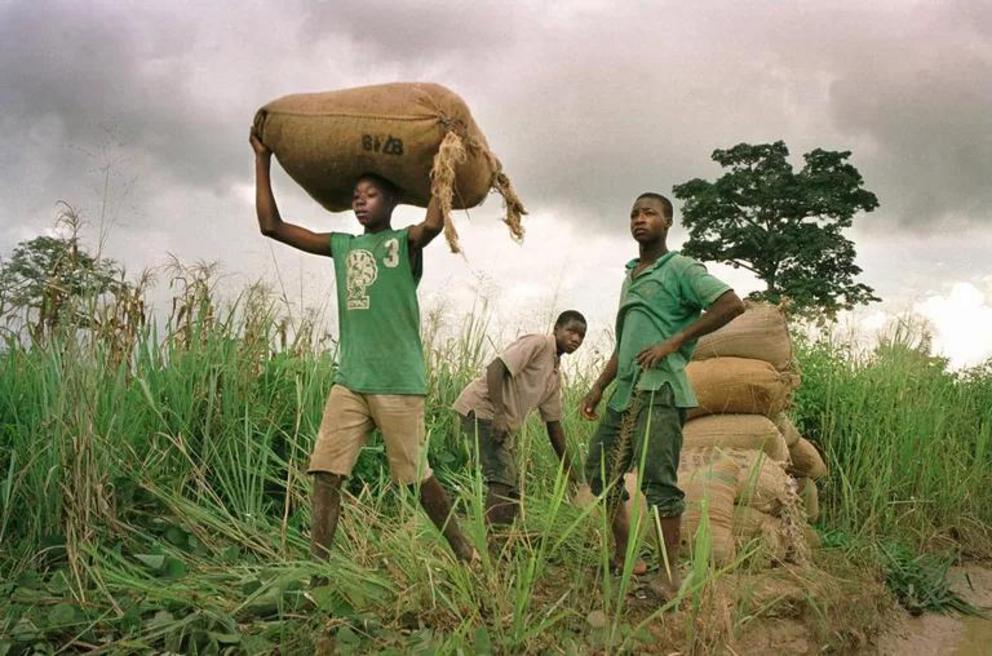COVID-19 is forcing more children into labor
Young workers carry sacks of cocoa on a farm in Ivory Coast, West Africa.
Here's an unusual way to help fight the coronavirus pandemic: Start buying Fairtrade-certified chocolate and coffee. The connection may not be immediately obvious, but Fairtrade International is warning that the pandemic has led to a deeply disturbing spike in child labor around the world. There are several reasons for this.
Schools are closed and there are fewer places for children to go, which means that more children are being forced into laboring. There are fewer migrant workers flooding into West African cocoa and South American coffee plantations for the harvest season, due to their own health and safety concerns or responsibilities for caring for family members. Because the harvest is such a labour-intensive and time-sensitive operation, children are being brought in to meet this need.
Because travel is restricted or limited in many places, there is less oversight from traditional monitoring bodies, which means that some farmers can get away with breaking rules more readily than usual. Fairtrade International says that its "cocoa cooperatives in West Africa [have] reported cases of severe child labor in their communities but are unable to get government or specialist support to act."
This is not surprising. Economic downturns often result in increases in child labor, as they bring on poverty, and poverty is intimately linked to an underaged workforce. When parents become sick, children are responsible for earning wages to support the family, even if those wages are mere pennies.
"It is no coincidence that an estimated 2 million children are in child labor in West Africa, where many cocoa farmers still earn less than $1.50 a day. Fairtrade believes the best way to eliminate extreme poverty [and child labor, by extension] is to pay farmers and workers a fair price for their crops."
Proposals have already been made in the coffee sector to reduce the minimum age of workers (usually 16) to cope with a labor shortage. There is fear that other sectors will follow, reversing hard-won gains that have taken years to achieve. "Weaker laws and stretched government budgets will result in more child labor, especially in rural and agricultural sectors," a blog post on the Fairtrade Foundation website says.
The smallholder farms that produce two-thirds of the world's cocoa and much of its coffee were struggling to make ends meet even before the pandemic hit. As Fairtrade America spokeswoman Mary Linell-Simmons explained in a June interview on the Innovation Forum podcast, "Historical injustice are coming to the fore now with this current crisis." For example, the average price per pound of coffee is US$1.02, but Fairtrade says the lowest sustainable price is US$1.40, a 40% increase over what farmers are getting. Many are losing money, bulldozing their plants to replace with more profitable palm or coconut oil plantations, or quitting farming altogether because it does not make financial sense to continue.
In West Africa the average age of a cocoa farmer is 50 years, but the average life expectancy is only 60. Elderly farmers are not being replaced by younger generations because young people do not want to work so hard for less than $2 per day. There won't be chocolate on store shelves, Linell-Simmons said, if this trend continues – or much of it will be chocolate made from cocoa tainted by dirt-cheap child labor.
Fairtrade International is working to fight the rise in COVID-19-induced child labor in a number of ways. It's working with producer organizations to "heighten their awareness" about the risks of child labor. It has created a new Producer Relief Fund to alleviate some of the financial challenges brought on by COVID-19, e.g. food packages to replace a once-vital school lunch for children and personal protective equipment for workers. And it's calling on governments to take action on child labor and invest more resources in protecting children.
Brands are responsible for sourcing ethical products, too. As Linell-Simmons stated, many companies have donated money in recent months to hospitals, food banks, and front-line workers, but if they continue to sell products made with child labor, their so-called commitments to justice and equality become doubtful.
"Companies really need to be actively working to combat such issues [as child labor] and taking them on as their problems, not ignoring them and hoping it doesn't affect their supply chain; because, at the end of the day, if you're not actually looking into your supply chain, you can no longer claim that you just didn't know and you're sorry. No one's going to care if you donated to first responders if you have children working in the fields or the factories."
Buying Fairtrade-certified products helps to create stronger supply chains, too. That way companies know they'll get what they need, when they need it.
That responsibility trickles down to consumers. More than ever now, we need to choose Fairtrade-certified coffee, chocolate, and other products when shopping. It may feel like a hard decision in the moment, as Fairtrade chocolate in particular is more expensive, and it does not have the same immediate benefits that, say, environmentally-friendly products do (i.e. buying organic to avoid pesticides in one's dinner that night), but it does have a profound long-term impact.
Buying Fairtrade sends a message that says, "I will not tolerate children working to make these products." It says, "I value children's education and right to play more than a cheap price." It says, "I will not allow the pandemic to derail children's chances at education." It's small-scale activism, but at this point every little effort adds up.

